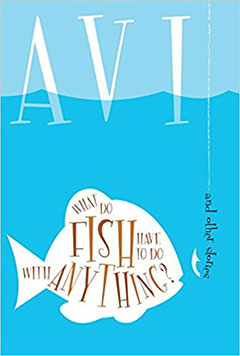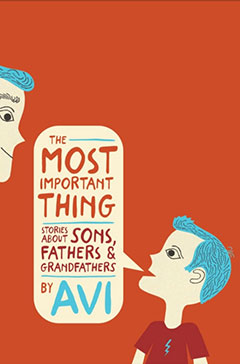Though writing short stories is nothing I do on a regular basis, I read them, and occasionally write them. More often than not I have written them at the behest of editors asking for a story for a themed anthology, such as “Loss,” or “Guns,” “School Life,” or even the beginning of a new millennial, as say, the year 2000.
 In 1997, a collection of my stories was put together under the collective title, What Do Fish Have to do with Anything? It was published by Candlewick.
In 1997, a collection of my stories was put together under the collective title, What Do Fish Have to do with Anything? It was published by Candlewick.
Over time, that book proved sufficiently successful that the publisher asked if I would like to put together another such volume.
I gathered up a collection of previously published stories and put them together. (One of the stories had been written for an anthology but never published.)
The Candlewick editor thought four of these stories suggested a theme—father/son relationships—and suggested these might be the topic of a new collection. But, I would need to write three new ones. That I did.
When I write my novels, the characters, the plots, and the settings are almost wholly creations of my imagination. By contrast, when I write short stories they tend to come out of my own experiences or experiences I have observed close at hand.
 Thus, one of the stories in The Most Important Thing is based, for the most part, on something that really happened to me. See if you can determine which one.
Thus, one of the stories in The Most Important Thing is based, for the most part, on something that really happened to me. See if you can determine which one.
Writing short stories—for me—is both challenging and fascinating. Write a novel, and one needs to illuminate—as if with barn fire—whole aspects of life. My thinking about short stories is that one uses a (metaphoric) flashlight to illuminate one aspect of life. A novel must (at its best) reveal the whole. A short story suggests the whole. Or, as someone said, (I don’t recall who) “A short story is a photograph; a novel is a film.”
A quick snapshot of how current readers receive a book may be had by comparing the professional reviews (Booklist, SLJ, Kirkus, etc.) of this short story collection with the reviews of the same book on say, Goodreads. Whereas the professional reviews were upbeat—among the best reviews I have ever had—the private reviews tended to be downbeat, with a clearly stated desire that they wished these stories could have been uplifting, positive, putting father/son relationships in a cheerful context. While the private reviews were dismissive of the stories’ connections to reality, the professional reviews applauded that connection. Curious.
But, then, one of the curious things about short stories is that they can lead to long discussions.